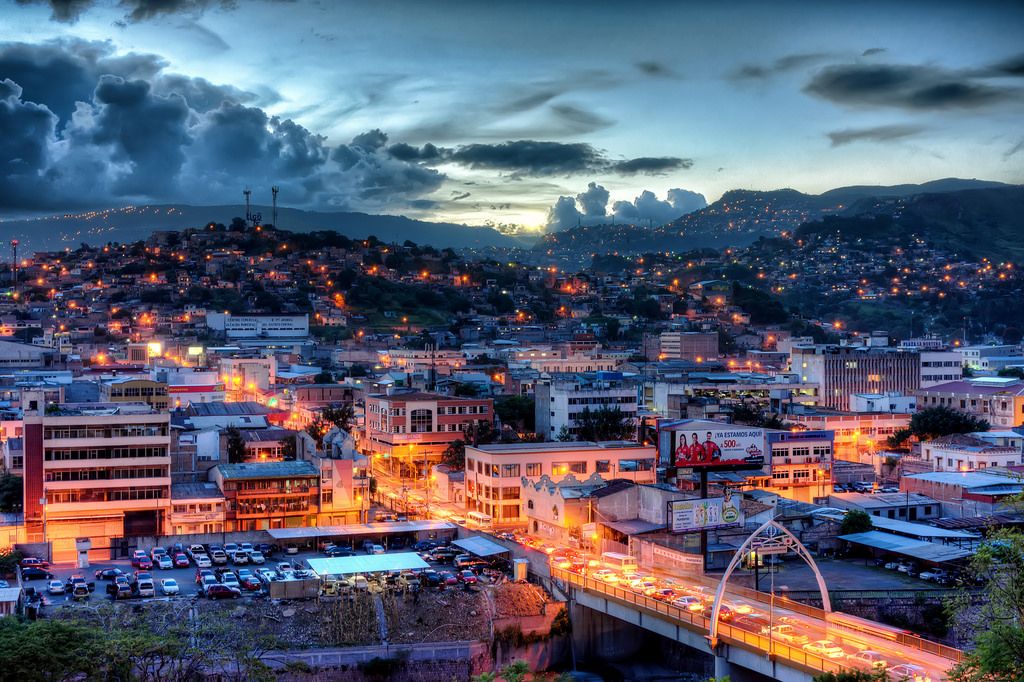Honduras is a republic in Central America bordered by Guatemala El Salvador and Nicaragua. It covers112492km2 of Caribbean and Pacific coastline mountains coastal plains and dense rainforests. Its name derives from the Spanish word for deep waters referring to the Gulf of Honduras. The population is9904607 and rising. Spanish is the official language; English is common in Bay Islands; indigenous languages like Garifuna Miskito and Lenca survive in rural areas. Alcohol is legal from age18 with sales regulated by state licenses; narcotics are strictly prohibited though illicit cultivation and trafficking persist. Gambling is allowed through the national lottery and in licensed casinos under strict oversight. The highest authority is the President elected for a four-year term; legislative power rests with a unicameral National Congress. Honduras maintains armed forces comprising Army Navy Air Force and National Police under civilian command.
History
Human presence in Honduras dates back over10000 years when Paleoindian hunters roamed the dense forests following megafauna. By1500BCE early agricultural communities began domesticating maize beans and squash. From300CE to900CE the classic Maya civilization flourished in western Honduras at sites like Copán which became major city-states of art astronomy and trade. The stelae and hieroglyphic stairway at Copán attest to rulers’ lineages and advanced calendrical systems. Decline of Classic Maya around900CE was followed by social realignment and smaller polities in the Ulúa and Río Bendegó valleys.
Spanish exploration began in1502 when Christopher Columbus sighted Punta Castilla. Conquistadors Hernán Cortés Francisco de Montejo and Cristóbal de Olid landed along the northern coast in1524 and by1539 had founded Trujillo and Comayagua. Initial colonial economy relied on gold mining and forced indigenous labor under the encomienda system. Harsh conditions decimated native populations and led Spaniards to import African slaves, shaping the region’s demographic mosaic. The Captaincy General of Guatemala established administrative control from1540 until independence.
Enlightenment ideas and creole dissatisfaction with colonial reforms spurred independence movements across Spanish America in the early19th century. In1821 Honduras joined the Mexican Empire under Agustín de Iturbide but seceded in1823 to form the Federal Republic of Central America with Guatemala El Salvador Nicaragua and Costa Rica. Persistent internal conflicts over centralism versus federalism fractured the union, and by1838 Honduras emerged as a sovereign republic with Tegucigalpa as capital.
The late19th century ushered in the “banana republic” era as US fruit companies like United Fruit Company and Standard Fruit Company acquired vast coastal plantations. Their influence shaped politics economics and infrastructure yet fostered dependency and social inequalities. Coffee, mining and railroads expanded under successive liberal and conservative administrations. Territorial disputes with Nicaragua and Guatemala led to Boundary Conventions arbitrated by the US and Britain.
In the early20th century Honduras experienced multiple US military interventions to protect foreign investments. Political instability peaked with coups and military dictatorships from1919 to1957. The football-triggered “Football War” with El Salvador in1969 was a brief conflict over land reform and migration. Constitutional rule returned in1982 but national security concerns during the Cold War saw Honduras hosting US-backed Contra rebels from Nicaragua, drawing the country into regional proxy struggles. Leftist guerrilla movements formed but remained limited compared to neighbors.
Democratic consolidation in the1990s brought freedom of press judicial reforms and decentralization. Hurricane Mitch in1998 devastated infrastructure killed over10000 and triggered large-scale reconstruction and international aid. In the21st century Honduras has grappled with drug-related violence gang extortion and corruption scandals. Massive protests in2009 followed a contested removal of President Manuel Zelaya. Subsequent administrations have sought to strengthen rule of law reduce poverty and attract investment in tourism and renewable energy. The election of Xiomara Castro in2022 marked the first female president pursuing a platform of social welfare and anti-corruption.
Industry
Honduras’ economy relies on agriculture manufacturing services and remittances. It is the world’s leading exporter of raw coffee beans and ranks among the top banana exporters globally. Major brands include Café Artesanal Lenca and Tropicana banana products. Textile maquila factories produce garments for international retailers under brands like Hanes and Fruit of the Loom. The brewing industry led by Cervecería Hondureña produces Salva Vida and Portillo beers. Palm oil and shrimp farms along the Mosquitia coast supply regional markets. Honduras holds a record for annual coffee export exceeding6million 60kg bags.
Religion and Ethnicities
Christianity dominates with Catholicism at46 percent and Protestant Evangelical churches at41 percent. Other faiths including Jehovah’s Witnesses Mormons Muslims and indigenous spiritual practices account for the remainder. Ethnically Mestizo90 percent White7 percent Indigenous2.3 percent and Black/Afro-Caribbean including Garifuna0.7 percent. Religious traditions blend Catholic holy days with Garifuna rituals like the UNESCO-recognized Punta music and dance festival each November in Puerto Cortés.
Wars and Conflicts
Honduras has engaged in territorial disputes with Nicaragua over the Gulf of Fonseca adjudicated by the International Court of Justice in1992. The 1969 conflict with El Salvador lasted100hours and prompted ceasefire under US mediation. During the Cold War Honduras hosted Contra forces opposing Nicaragua’s Sandinista government from1981 to1990, leading to cross-border skirmishes and military encampments. Internal security operations against leftist guerrilla bands occurred in the1980s with reports of forced disappearances. No formal war has occurred on Honduran soil since but gang violence kills thousands annually. There are military cemeteries at San Lorenzo and Comayagua honoring aged conflicts. Terrorist attacks are rare though extortion-related killings by gangs are widespread.
Standard of Living
Honduras ranks136 of191 on the UN Human Development Index with per capita GDP around2700USD. Poverty affects49 percent of the population and extreme poverty14 percent. Transparency International positions Honduras at157 of180 for corruption perception. Access to education and healthcare varies widely between urban centers and rural communities.
Medicine
Healthcare is delivered through public hospitals clinics and private facilities. Quality is highest in Tegucigalpa and San Pedro Sula; rural areas rely on underresourced health posts. Pharmacies operate Monday to Saturday08:00–20:00 and Sundays10:00–14:00 in cities with limited rural service. Tourists should carry travel insurance and vaccines for hepatitis A typhoid and tetanus boosters. Malaria prophylaxis is recommended for Mosquitia and rural lowlands. Tap water is unsafe outside urban areas; bottled water is essential.
Sport
Football is the national passion with Liga Nacional teams and the Honduras national team competing in FIFA World Cups. Baseball thrives on the Caribbean coast producing MLB players like Wilson Ramos. Boxing medalists have emerged in Olympic competition. Mountain biking and surfing are growing sports at La Ceiba and Tela. Honduras has fielded athletes in athletics judo swimming and cycling at Summer Olympics since1968.
Holidays
New Year’s Day January1 features fireworks and family gatherings. Holy Week March or April sees processions in Comayagua and Tegucigalpa. Labour Day May1 marks parades and cultural fairs. Independence Day September15 celebrates the1821 emancipation from Spain with flag-raising and military parades. Garifuna Settlement Day November19 honors AfricanCaribbean heritage with drumming parades in Trujillo. Christmas December25 includes midnight mass and festive fueladas in public squares.
Traditions
Hondurans value hospitality—invite guests for coffee and fried platano. Greet with a handshake and maintain eye contact. Remove shoes when entering private homes and churches. Dress modestly for religious events—cover shoulders and knees. During novenas and patron saint festivals avoid loud behavior and respect processional routes.
Interesting Facts
Copán ruins feature a UNESCO-listed hieroglyphic stairway and Mayan ballcourt. The Río Plátano Biosphere Reserve is one of the largest protected rainforest areas in the Americas. Hurricane Mitch in1998 caused floods and landslides killing over10000 and reshaping disaster management. Honduran actress America Ferrera won an Emmy for her lead role in Ugly Betty. Scenes from the film The Mosquito Coast were shot near Tela. In2011 a record-breaking world’s largest tortilla of diameter3m was created in San Pedro Sula.
Money
The currency is the Honduran lempira (HNL). ATMs and banks are common in major cities; rural areas may lack machines. Credit cards are accepted at hotels restaurants and international retailers. Exchange services at banks airports and exchange houses offer best rates; avoid street exchangers. Cash is preferred in markets and local eateries. Tipping of10 percent in restaurants and rounding up taxi fares is customary.
Household Details
Electricity is120V at60Hz in Tegucigalpa and San Pedro Sula and split between120V and220V in rural areas; adapters may be needed. Plugs types A and B are standard. Mobile networks by Tigo Claro and Hondutel provide 4G coverage; 5G is in pilot phases. Public Wi-Fi is available in cafes hotels and airports. Tap water is chlorinated in cities but bottled water is safer.
Clothing
Dress according to climate—light breathable clothing in coastal lowlands; layers in highland evenings. Shorts and short skirts are acceptable at beaches and resorts but avoid them in urban and religious sites. Open-toed sandals are fine for casual wear; closed-toe shoes for hiking or muddy streets. Cover shoulders in churches and carry a light hat for sun protection.
Tourism
Touring Honduras thoroughly takes10–14 days. Begin at Copán Ruins for Mayan archaeology then travel to Lake Yojoa for birdwatching waterfalls and coffee farms. Visit Pico Bonito National Park near La Ceiba for jungle lodges rafting and zip lines. Explore the Caribbean Bay Islands of Roatán Utila and Guanaja over4–5 days for diving whale sharks and beaches. Experience Garifuna culture in Trujillo and Tela. Trek the Celaque mountains near Gracias over2–3 days to summit Honduras’ highest peak. End in Tegucigalpa and Comayagua for colonial architecture museums and handicraft markets. Transport combines domestic flights executive buses and private shuttles along routes that require planning for road conditions and scenic mountain drives.
Types of Tourism
Cultural tourism at Mayan and colonial heritage sites. Ecotourism in rainforests and cloud forests. Adventure tourism for rafting canyoning and zip lining. Beach and dive tourism at Bay Islands. Community tourism with Garifuna villages and coffee haciendas.
List of Tourist Attractions
Copán Ruins – major Maya city with stelae and hieroglyphic stairway, UNESCO site
Pico Bonito National Park – cloud forest biodiversity and adventure activities
Lake Yojoa – largest natural lake with waterfalls caves and birdwatching
Roatán Marine Park – coral reefs scuba diving and marine conservation
Celaque National Park – cloud forest reserve and summit trail
List of Non-Tourist Attractions
Comayagua Central Market – bustling local produce and textile hub
San Juancito Mining Town – historic miners’ settlement east of Tegucigalpa
Mosquitia Road – remote jungle highway revealing rural Honduran life
La Esperanza Coffee Cooperative – artisanal coffee production by Lenca women
Tela Fruit Market – early-morning pineapple banana and seafood auctions
Local Cuisine
Baleadas – flour tortillas folded with refried beans cheese crema and avocado
Sopa de caracol – conch soup cooked in coconut milk and spices
Enchiladas hondureñas – fried tortillas topped with ground beef cabbage and salsa
Tapado – seafood chowder with plantains yucca and coconut broth
Carne asada with tajadas – grilled beef with fried plantain slices
Breakfast07:00–09:00 lunch12:00–14:00 dinner18:00–20:00. Local beers Salva Vida Portillo and ron Zacapa are popular. Street stalls vary in hygiene; choose crowded vendors. Tipping10 percent in restaurants is polite.
Why Visit
Honduras offers exceptional biodiversity ancient Mayan heritage vibrant Afro-Caribbean culture and world-class diving at an affordable cost. Its remoteness rewards travelers seeking authentic off-the-beaten-path experiences.
Safety for Tourists
Crime rates are high in some urban neighborhoods; travel during daylight and use registered taxis or tour operators. Tourist zones in Bay Islands Copán and La Ceiba are generally safe. Gangs avoid high tourist visibility. No dangerous wildlife in cities; mosquitos can carry dengue so use repellent. Medical facilities with emergency care exist in major centers. Hondurans welcome foreigners of all backgrounds with friendliness.
Tourist Infrastructure
Five-star resorts on Roatán and eco-lodges near Copán provide international standards. Midrange hotels and guesthouses in major towns cater to varied budgets. Restaurant staff and guides often speak English and Spanish; indigenous community tourism works with bilingual local hosts.
Entry Rules
Many nationalities enter visa-free for up to90 days; others require e-visa prior to arrival. Passport must be valid for six months beyond entry date. Customs restrict narcotics arms exotic wildlife fresh produce and cash over10000USD without declaration.
Transport
Frequent domestic flights link Tegucigalpa San Pedro Sula La Ceiba and Roatán; tickets bookable online. Executive and normal buses serve intercity routes; purchase tickets at terminals. Tegucigalpa and San Pedro Sula offer bus rapid transit. Water taxis connect Bay Islands.
Automobile
International driving permits recognized. Drive on the right. Car rental available at airports and major cities. Police checkpoints may inspect documents; bribery is illegal but sometimes solicited. No toll roads on main routes. Blood-alcohol limit0.03 percent. Speed limits50km/h in towns 80km/h on highways. Few speed cameras exist. Dashcams are common among expatriates. Winter tyres not required. SUVs or four-wheel-drive vehicles are recommended for mountain roads. Fines begin at1000HNL.
Noise Regulations
Quiet hours generally from22:00 to06:00 in residential and hotel areas. Loud music and construction are prohibited near hospitals, schools and churches at all times of worship.
Daily Budget
Budget travel costs1500–2000HNL (60–80USD) per day including backpacker hostels local meals and ground transport. A comfortable budget3000–5000HNL (120–200USD) per day covers midrange hotels guided tours and restaurant dining.
Prohibited for Tourists
Do not fly drones over archaeological sites or military installations. Avoid photographing security forces. Public displays of affection and disrobing on beaches are frowned upon.
Climate
Honduras has a tropical climate along coasts with temperatures25–32°C year-round; central highlands range15–25°C. Rainy season runs May to October with peak precipitation in September. Best travel season is December to April for dry sunny weather.
Travel Tips
Ensure routine immunisations plus hepatitis A typhoid and tetanus boosters. Malaria prophylaxis for Mosquitia region. Use insect repellent and wear long sleeves at dawn and dusk to avoid mosquito bites. Keep copies of passports and travel insurance details. Learn basic Spanish greetings and emergency phrases. Register travel plans with your embassy and always use licensed guides for remote excursions. Enjoy Honduras by respecting its natural beauty and cultural heritage.
- Sanin Coast Road Trip
- Haruto Takahashi Found Pirate Treasure in Madagascar and Rowed It Home
- Honduras
- Moscow
- Pura Vida on the Road: the nuances of traveling Costa Rica
- Morocco
- Niger
- Armenia
- Dagestan
- Chechnya
- Dance of Spirits in the Arctic Sky: The Northern Lights in Lofoten Island Mythology
- Moab
- Turkmenistan
- How a traveler can earn on the road
- Saami
- Aztecs
- Win a four-night Greek getaway for two in one of the most stylish resorts in the Aegean courtesy of Sani Resort
- Pirate treasure hunting around the world: where to look without breaking the law
- Interesting facts about Baikal
- Kostroma (Russia)












